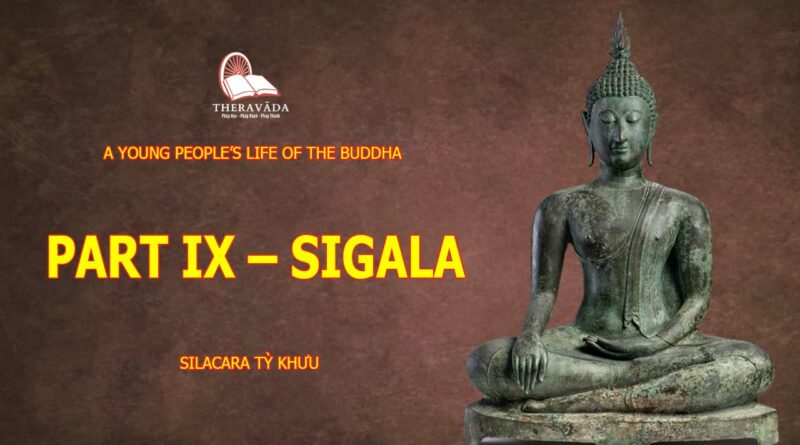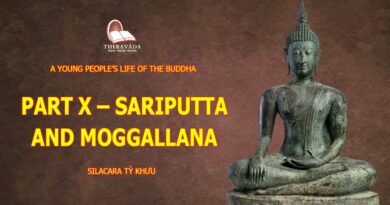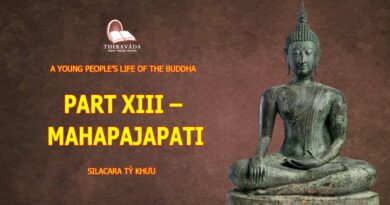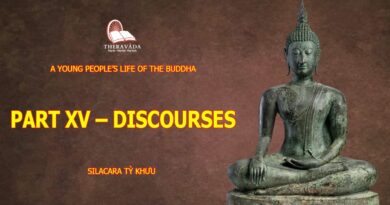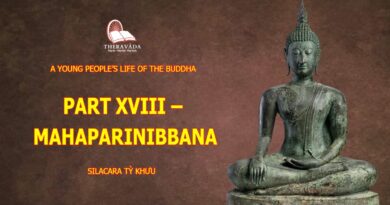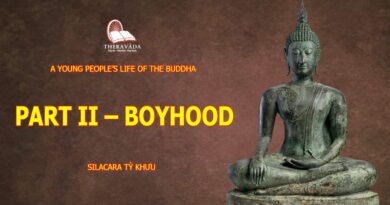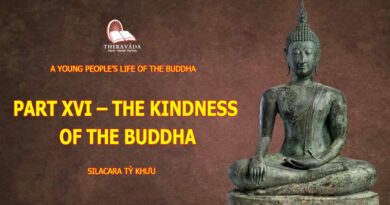A YOUNG PEOPLE’S LIFE OF THE BUDDHA: PART IX – SIGALA
In the meantime the two merchants Tapussa and Bhallika, the first men in the world to call themselves the followers of the Buddha, had traveled on, and in the course of their journeying, come to Kapilavatthu. There they told everybody that they had seen Siddhattha the son of their king, at Uruvela, and that He had actually become, as had been prophesied, a very great religious teacher, indeed, the greatest religious teacher in the world, an Awakened One, a Buddha. And they said they had heard that He was coming soon to Kapilavatthu.
And, shortly after the Buddha had sent out the sixty Arahans to preach His Doctrine everywhere, He himself also left the deer-park at Isipatana, and turning Southwards in the direction of the Magadha country, at length came back to Uruvela. Here he stayed for a time, and entered into talk and discussions with a number of hermits who were living there under a leader called Kassapa. And after He had explained His Doctrine to them, Kassapa himself, their leader and teacher, accepted the Buddha’s doctrine as true, and asked the Buddha to receive him into the Order of His Bhikkhus. And later on, by meditating and practicing as the Buddha taught him, he became an Arahan, and after the Buddha had passed away, he was one of the leading Arahans who maintained the doctrine in its original purity.
But now, leaving Uruvela, the Buddha wandered on through the country towards Rajagaha the capital city of Magadha, to keep His promise to its king, Bimbisara, that when He had found the Truth, He would come and let him and his people know it. And King Bimbisara and his people received Him with great gladness, now that He had become a Buddha. And in a grove of bamboo trees a little way outside the city He stayed many days, teaching and preaching so kindly and so persuasively, that the king and all his people accepted His teaching entirely and became His declared followers. And the king, to show the respect in which he held the Buddha and His Teaching and the Brotherhood of Bhikkhus, made Him a gift of the Bamboo Grove and of a fine Vihara he caused to be build there, so that He and His Sangha would always have a comfortable place to live in during the rainy season.
Now one morning as the Buddha left the Bamboo Grove to go into Rajagaha to beg alms of food, He saw a young man all dripping wet as if he had just come from bathing, standing in the roadway and bowing in each of the four directions, East, South, West and North, as well as to the sky overhead and to the ground beneath his feet, at the same time throwing rice in each of these directions.
The Buddha looked at the young man as he went through this strange performance on the public street, and then He stopped and asked the young man why he was acting like that. The young man replied that he was only doing what his old father had asked him to do each morning so as to keep any evil from coming to him during each day from any of the four directions, or from the gods above, or from the demons below. It was his father’s last wish, spoken on his death-bed, so he could not deny him his wish. And every day since his father had died, he had faithfully observed his promise without missing a single morning.
“It is very right of you,” said the Buddha when He heard the young man’s answer, “to keep the promise you made to your dying father and carry out his wish faithfully; but what you are doing is not really what your father meant.”
“When your father told you that you were to bow down to, and make an offering of rice to the East, he meant that you were to show respect and honor to those through whom you have come into life, namely, to your parents. By worshiping the South, he meant worshiping and honoring your teachers through whom you get knowledge. By worshiping the West, he meant cherishing and supporting wife and children. By worshiping the North, he meant holding in esteem all relatives and friends, and helping them where they have need of help. By worshiping the sky, he meant worshiping and reverencing all that is good and holy and high. And by worshiping the earth, he meant respecting the rights of every creature, even the smallest and meanest that lives upon it. This is the way in which your father wished you to behave so that no harm would come to you any day from any quarter whatsoever.”
And there and then the Lord Buddha went on to give Sigala — for that was the name of the young man He was speaking to — some good counsel as to how he should live so as to make his own and other people’s lives happy and fortunate here and now, and in the future earn an equally happy and fortunate lot. He told Sigala to abstain from killing and stealing and lying and lewdness and the using of intoxicating drinks or hurtful drugs. He told him to avoid bad companions and cultivate the acquaintance of good people. He told him to work diligently so as to get wealth, and then to take care of the wealth he earned, but yet not to be greedy in keeping it all to himself, nor yet foolish in throwing it away again on foolish objects, but to use a fourth part of it in supporting himself and all depending on him, his wife and family, another fourth part in building up and extending his business further, another fourth part in helping any one in need of help, and the last fourth part he was to lay aside and keep in case misfortune should come to him and he should need help himself.
Young Sigala listened respectfully to all the good counsel the Lord Buddha thus gave him. Then he confessed that when his father was living, he had often told him about the Buddha and what a great and good teacher He was, and had tried to get him to go and see the Buddha and hear Him preach; but he always refused to go, saying that is was too much trouble and would only weary him, and that he had neither time nor money to spend on wandering ascetics like Gotama. And Sigala now asked the Buddha kindly to pardon him for his former neglect, and to accept him as a follower; for, so he promised the Lord Buddha, he meant to worship the six directions of space exactly in this right way which the Buddha had just taught him, for all the rest of his life.
The full account of all the Buddha said to Sigala that morning in the streets of Rajagaha, can be read in the Sigalovada Sutta of the Samyutta Nikaya.
Source: Budsas.net

